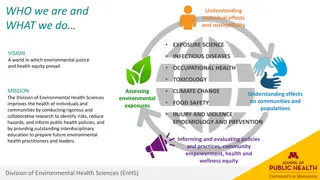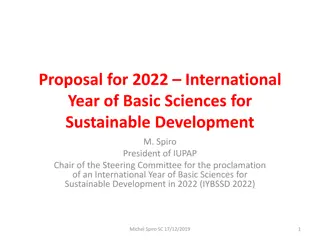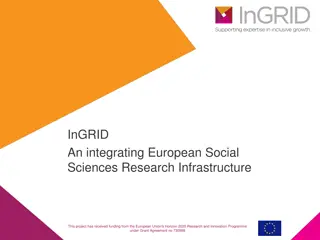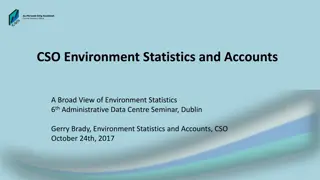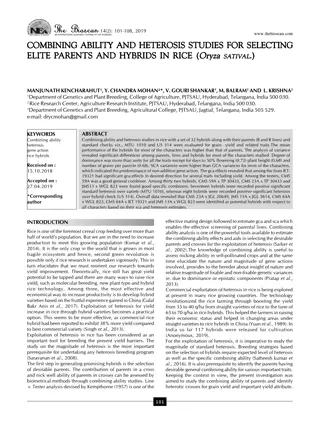Introduction to Research Methods in Medical and Environmental Sciences
Research is a systematic process of seeking new facts and knowledge on a specific topic, involving problem identification, investigation, data collection, analysis, and interpretation. This course covers key aspects such as research definition, methods, methodology, stages of a project, report format, and more.
Download Presentation

Please find below an Image/Link to download the presentation.
The content on the website is provided AS IS for your information and personal use only. It may not be sold, licensed, or shared on other websites without obtaining consent from the author. Download presentation by click this link. If you encounter any issues during the download, it is possible that the publisher has removed the file from their server.
E N D
Presentation Transcript
UNIVERSITY OF NIGERIA, NSUKKA UNIVERSITY OF NIGERIA, NSUKKA SCHOOL OF POSTGRADUATE SCHOOL OF POSTGRADUATE STUDIES STUDIES Course Title: PGC 601 Research Methodology In Medical, Health & Environmental Sciences By Professor F.E. Ejezie PhD Dept. of Medical Biochemistry Faculty of Basic Medical Sciences College of Medicine fidelis.ejezie@unn.edu.ng; 08034069138
OUTLINE What is Research? Research Methods & Research Methodology Stages of a research project Format for Research project report Chapters of a research project report
GOALS AND OBJECTIVES At the end of the lecture, the students will be able to: Define research and identify the focus of research process Outline the major stages of a research project Develop a research question Select a research method Establish a sample population Gather, analyse and present data Interpret and discuss research results/data Arrange a research project report in chapters
What is Research? Research may be defined as a systematic way to look for new facts, knowledge and information on a specific topic. It is a movement from known to unknown Involves the identification of a problem Investigation of the problem To provide more facts and information Through planned collection, analysis and interpretation of data Research is obtained in ALL disciplines and May also be multi-disciplinary research
Research Methods vs Research Methodology The term "research methods" typically refers to the strategy or plan that a researcher has devised in order to gather data in a particular subject or topic. In the sciences, they include experiments, tests, surveys......etc. Methods may be laboratory, clinical, field work, studio, questionnaire .........etc While "research methodology" "research method," research methodology refers to the systematically arranged steps/stages involved in a research process. Eg. statement of problem, literature review, research method........etc sounds similar to
Why do Research? Research reports may be used in: Academic exercises like award of Degrees, Diplomas, Fellowships, Certificates, Promotion Or Applied to improve quality of human life and develop different spheres of life
Introductory Stage Review of literature Statement of problem Aim of research Specific objectives Hypothesis formulation
Execution Stage Research design preparation Data collection Data analysis and interpretation
Concluding Stage Discussion Conclusion Recommendation Report writing References
Definition of Research Problem Identify the Research problem Select the Research Topic Understand the research problem thoroughly A problem could be identified through: review of literature (vast reading) observation of events discussions/consultations with other researchers Now formulate the research question Eg Does parity have any relationship with obesity in pregnant women? Do micronutrients play any role in pregnancy outcome? What is the influence of parental academic standard on the school performance of children? Research questions could be refined or modified.
Statement of Problem(Justification) Enables researcher to systematically point out what the problem is Why the problem should be solved What is to be achieved It justifies the study A good literature search is very useful in the statement of problem.
Review of Literature This is a very important aspect of project formulation May be continuous throughout the project execution Helps to find available information on the topic Should be extensive and focused Helps to know what others have done or reported
Review of Literature contd Prevents duplication Identifies contested issues Provides facts for the justification of research project Helps in formulation research questions Provides a guide for choice of methods, sample size, & statistical analysis (design) of objectives and
Sources of Literature Journal articles Abstracts Books Internet Newspapers/magazines Interviews Technical reports Conference proceedings etc (Note all references) Most of these are found in libraries/e-libraries
Research Objectives What the research/researcher wishes to achieve/accomplish Should be feasible - achievable/practicable Should be specific Action verbs are to be used eg to determine, identify, verify, calculate, describe, reduce, identify, compare, measure .......etc No ambiguity May be put into: general and specific objectives
Hypothesis Formulation Is a prediction of the result of the research problem provides answers to research question Translates the problem statement into a precise, unambiguous prediction of expected outcomes May be stated as a positive or negative (alternative) statement Antioxidant micronutrients pregnancy outcome in Nigerian women A high cholesterol intake is not associated with the development (risk) of coronary heart disease Cigarette smoking is a cause of lung cancer are required for good
Research Design Materials and methods Provides techniques for deriving answers to the questions or testing the hypothesis Gives data sources and collection Sample size and method of collection Sample groups (test and control) Equipment Other tools Lab or field etc May be quantitative or qualitative/descriptive Ethical Considerations/ Certificate Time & funds are of essence
Sample Size Estimation Sample size should be large enough for -appropriate analysis - desired level of accuracy - validity of significant tests - confidence level Different formulae are given/used on different settings In all, a large sample size will yield more accurate results but may be more costly than a smaller sample size.
Data Collection Sampling techniques Simple random - eg lucky dip Systematic random - eg even nos, odd nos etc Stratified random Cluster Multi-stage Convenience etc
6 Data Analysis Computer programmes Graphs Tables Bar charts & pie charts Testing the hypothesis PROFESSOR AGUWA E.
Interpretation and Report Writing Major findings in the research are outlined and discussed May also mention findings from other related studies References and comparisons are made to past knowledge and reports Inferences are also drawn from the results/data Major contributions to knowledge are stated Limitations of the study may also be discussed
The findings in relation to the research questions and/or objectives are summarized as conclusion Recommendations are made based on research results/data and the problem the research project is addressing Recommendations should follow logically from the discussion of the findings References ordered sources of vital information used in the research Appendix raw data, standard tables, graphs, ethical certificate etc
References There are different reference styles The Vancouver system Harvard system American Psychological Association (APA) system American Chemical Society (ACS) style American Mathematical Society (AMS) style etc Institute of Electrical &Electronics Engineers (IEEE) system Style may vary from institutions, faculties, departments etc
Journal References If authors names are used in the text, followed by year of publication in brackets (Onyekwelu, et al 2017) the references should be listed in alphabetical order by authors last names. Ejezie F.E, Nwagha U.I. Zinc concentrations during pregnancy and lactation in Enugu, South-East Nigeria. Annals of Medical and Health Sciences Research. 2011. 1(1): 69-76. Books Ejezie, F.E. & Ikekpeazu, J.E. (2017). Fundamentals of Metabolism. (2ndedition). Enugu. Ezu Books Ltd. pp 150-163. Any style used must be consistent (eg. Ejezie, 2011);
Format for Research Report Preliminary pages Title or cover page Certification page Dedication Acknowledgement Abstract or summary Table of contents List of tables, figures List of abbreviations
Format for Research Report Main Report Sequence Introduction Objectives Literature review (Justification) Materials/patients and methods Results Discussion Conclusion Limitations(if any) Recommendations References Appendix
Chapters of Research Project Report Chapter 1 Introduction/objectives Chapter 2 Literature review Chapter3 - Materials & Methods Chapter 4 - Results Chapter 5 Discussion Chapter 6 - Conclusion & Recommendations References Appendix













